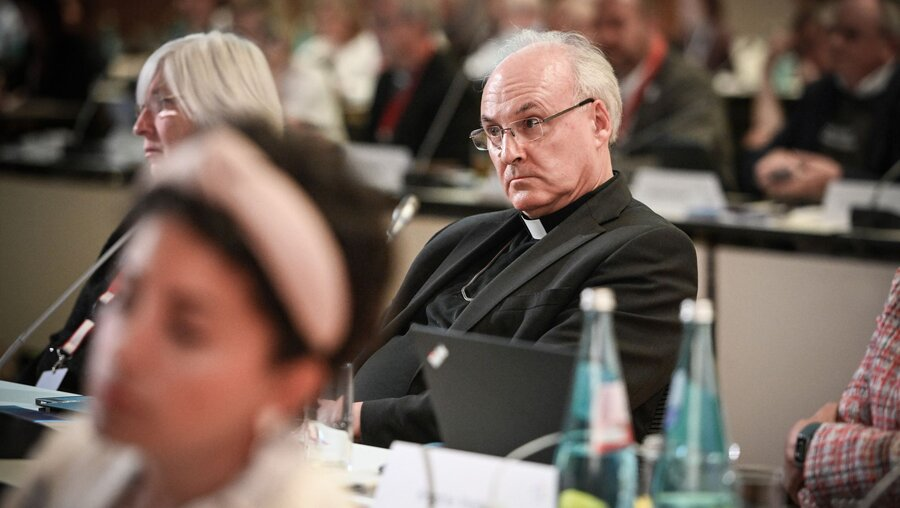Synodality plunged into crisis in Germany. Four brave Bishops turn off their money supply.
A Vatican paper, four bishops and lots of questions
When the Synodal Path to the Future of the Church in Germany was launched in 2019, it was a novelty in the Catholic world. In the meantime, reform debates are underway at many levels. That does not make things any easier.
Perhaps this Tuesday will one day go down in the annals of the Catholic Church. And not only in Germany but worldwide. While the Vatican held out the prospect of more participation for all Catholics, four bishops in Germany turned off the money tap - for the time being - for a project that is essentially about precisely that.
Four bishops oppose the project
In the Synodal Path, bishops and lay people had been talking about reforms since December 2019 as a consequence of the abuse scandals. It was about more control of episcopal power, women's rights and an appropriate way of dealing with the diversity of gender identities.
The Synodal Path ended in March - the deliberations are to be continued in a Synodal Council, which in turn is to be prepared by a Synodal Committee.
Gregor Maria Hanke (Eichstätt), Stefan Oster (Passau), Rudolf Voderholzer (Regensburg) and Cardinal Rainer Maria Woelki (Cologne) do not want to finance this committee through the Association of German Dioceses (VDD).
Bishop Hanke
Because the allocation of funds through the VDD must be unanimous, alternative financing models are now being sought, the German Bishops' Conference explained on Tuesday after a meeting of the Permanent Council of Bishops in Berlin.
Intersection of issues
The four bishops refer to reservations from the Vatican: the plan to organise a synodal committee in Germany already now is against the clear instruction of Pope Francis.
They first want to wait for the results of the World Synod in October 2023 and October 2024 in the Vatican. This World Synod was initiated by Pope Francis.
The Working Paper also published on Tuesday identified a number of topics for the first meeting in October that were also on the agenda of the Synodal Way in Germany.
Among other things, it deals with possible exceptions to celibacy for priests, access for women to the office of deacon, the lowest ordination level in the Church, or greater autonomy at regional and national level.
Experts dampen euphoria
The Assembly in Rome will presumably not make any concrete decisions on this, but is to discuss these and other topics. But a sign has been set by the fact that for the first time non-consecrated Catholics - and Catholic women - are participating in the talks in larger numbers.
Until now, co-determination at World Synods of Bishops was only possible for bishops and religious superiors.
Experts such as the emeritus Bonn canon lawyer Norbert Lüdecke warn against euphoria. In a contribution to the "Herder-Correspondence" in mid-May, he admitted that the pope "wants to give voting rights to hand-picked laypeople" at the Synod of Bishops.
In view of the reform debate in Germany, neither the establishment of a synodal committee nor a synodal council could be justified. At the synod of bishops in Rome, unconsecrated Catholics could sit at the table because the Synod "regularly doesn't decide anything" and this is up to the Pope alone.
Advise yes, decide no?
In line with this, the Vatican has pointed out several times that the Catholic Church in Germany is not authorized to set up a joint governing body of laypeople and clergy. Tenor: Laypersons are allowed to have a say, but as soon as they want to have a say in government, there is trouble.
The four bishops from Eichstätt, Passau, Regensburg and Cologne based their dissenting opinion, which has now been made public, on this.
Lüdecke's colleague, the Münster canon lawyer, Thomas Schüller, nevertheless sees this as an "open declaration of war", albeit for a different reason.
What's next?
There is a great danger that the VDD could be used in the future to settle disagreements about the future course of the church, Schüller told the Church + Life portal.
As is well known, the fun stops when it comes to money. Is there a danger that the church in Germany, whose image is already declining, will continue to disintegrate publicly? This is one of the many open questions surrounding the reform debate. Irrespective of this, those responsible want to stick to the original schedule.
"The first meeting of the synodal committee is scheduled to take place on November 10th/11th," says ZdK President Irme Stetter-Karp.










.jpeg)

Comments